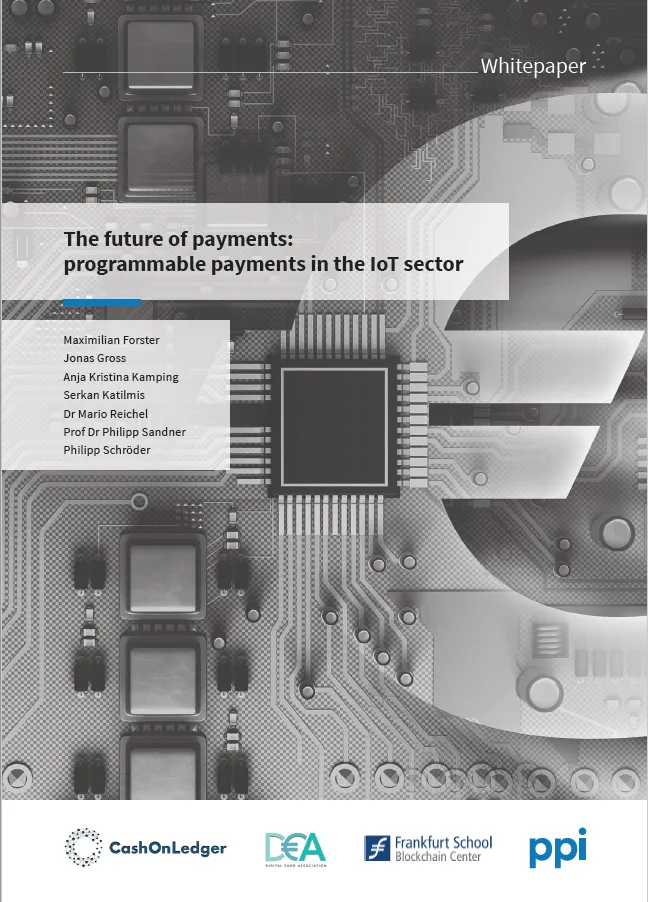The future of payments
Authors: Maximilian Forster, Jonas Gross, Anja Kristina Kamping, Serkan Katilmis, Dr. Mario Reichel, Prof. Dr. Philipp Sandner, Philipp Schröder
Digitization is taking hold of entire industries, including in Germany. The area of the “Internet of Things (IoT)”, in particular, promises revolutionary, new types of business models. In this context, the term IoT refers to the increasing connection of machines and devices to the Internet. These devices are equipped with digital identities to communicate with each other and execute processes autonomously without human intervention. This trend will become increasingly relevant in the future. For example, the total number of IoT devices is expected to rise to 75 billion by 2025, according to estimates.
Download the English paper here (German version here).

In this context, the distributed ledger technology (DLT) will play a key role. A DLT can be used for the underlying IoT business models as a trustless, standardized, and highly automated infrastructure on which IoT devices can act autonomously. However, to realize the full potential of the digitization of the industry and the IoT, the entire payment process must be optimized and adapted to the needs of IoT payments. Consequently, the payments associated with these new business models must be processed efficiently, automatically, and in real-time. In this context, it is essential to enable programmable payments. The current conventional SEPA payment system cannot meet all these requirements, as transaction processing is often delayed, and micropayments cannot be processed efficiently. However, using a DLT to manage and process euro payments can provide such a required payment solution. Euro-based smart contracts can be implemented to automate business processes, significantly increase process cycles, simplify payment processes, and enable IoT payments from machines to machines or other devices.
In this paper, we analyze the status quo of IoT payments and explain the limitations of using the SEPA system for IoT payments. Furthermore, we discuss how DLT-based euro payment solutions can be beneficial for IoT. In particular, we analyze a trigger solution — connecting the conventional SEPA system with a DLT –, stablecoins, tokenized e-money, tokenized commercial bank money, and a DLT-based central bank digital currencies (CBDC). Additionally, we outline specific use cases related to goods logistics and Asset-as-a-Service/Pay-per-Use that benefit from such payment solutions.
We find that the trigger solution will be sufficient in the short term to enable programmable payments. Nevertheless, the trigger solution does not address all current limitations of the SEPA system, as the euro remains in an account-based system. In the medium term, native, DLT-based euro solutions will therefore be needed, such as tokenized commercial bank money and e-money.
Remarks
Download the full paper here as PDF-file (German version here).
If you like this article, we would be happy if you forward it to your colleagues or share it on social networks. If you are an expert in the field and want to criticize or endorse the article or some of its parts, feel free to leave a private note here or contextually and we will respond or address.
Authors
Prof. Dr. Philipp Sandner has founded the Frankfurt School Blockchain Center (FSBC). In 2018 and in 2019, he was ranked as one of the “top 30” economists by the Frankfurter Allgemeine Zeitung (FAZ), a major newspaper in Germany. Further, he belonged to the “Top 40 under 40” — a ranking by the German business magazine Capital. Since 2017, he is member of the FinTech Council of the Federal Ministry of Finance in Germany. The expertise of Prof. Sandner includes blockchain technology in general, crypto assets such as Bitcoin and Ethereum, the digital programmable Euro, tokenization of assets and rights and digital identity. You can contact him via Website, mail, via LinkedIn or follow him on Twitter (@philippsandner).
Jonas Gross is a project manager and research assistant at the Frankfurt School Blockchain Center (FSBC). His fields of interests are primarily cryptocurrencies. Besides, in the context of his PhD, he analyzes the impact of blockchain technology on monetary policy of worldwide central banks. He mainly studies innovations as central bank digital currencies (CBDC) and other crypto currency projects as “Diem”. You can contact him via mail, LinkedIn and via Xing.



